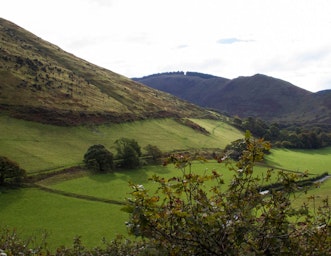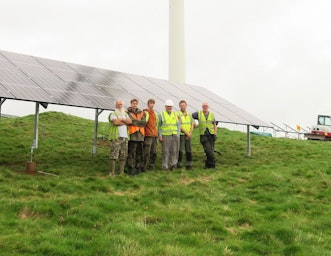
From ‘NDCs’ to ‘Loss and Damage’, the language used in the UN climate talks can make it difficult to follow what’s going on. Sarah Briggs is here to help.
As COP27 begins in Sharm El-Sheikh, Egypt, a whole raft of terminology and jargon we don’t usually hear will start to appear in the media and across social media channels.
Even if you’re involved in climate campaigns or work in sustainability, some of these terms may be unfamiliar, or you may want a refresher on some of the lingo.
This guide aims to unpick some of the language and terms that are commonly heard throughout COP to make it more accessible and enable more people to connect to this crucial process.
COP
COP stands for ‘Conference of the Parties to the United National Framework Convention on Climate Change’. The number following, e.g. COP27, represents the number of COPs that have taken place since the convention was signed at the Earth Summit in Rio in 1992, while ‘parties’ are the countries participating in the conference.
World leaders and their delegations attend COPs to evaluate progress towards achieving previous commitments, including targets in the 2015 Paris Agreement, and to come together to negotiate and agree on climate change policy and actions.
Organisations representing academia and research, environmental NGOs, youth organisations, rights groups, trade unions, farming communities and more have ‘observer status’, allowing them to sit in proceedings for transparency and allowing the input of additional expertise and perspectives.
Fringe events often take place too, with organisations and campaign groups holding events and workshops on key policy areas and aspects of the climate agreements.
The Paris Agreement
This groundbreaking treaty was the first legally-binding global agreement to act to tackle climate change and work to limit its impacts.
A commitment to limit warming to “well below” 2°C whilst “pursuing efforts” to not exceed 1.5°C above pre-industrial levels was agreed.
At COP26 in Glasgow last November, “keeping 1.5°C alive” was a focus of the conference to avoid the catastrophic climate impacts forecast by the IPCC (see below for IPCC).
NDCs
To achieve the goal of limiting warming, countries have to submit plans that set out their emissions reduction targets and some details on how they will be achieved – these plans are known as ‘Nationally Determined Contributions’ (NDCs).
The initial NDCs submitted were not sufficient to reduce emissions in line with the 1.5°C target, so a “ratchet” mechanism was included in the Paris Agreement, requiring countries to submit new or updated NDCs by 2020 and every five years thereafter.
AT COP26, all countries were asked to revisit and strengthen their plans during 2022 rather than waiting five years, but to date only 24 new or updated plans have been submitted. The UN Emissions Gap report published last week found that implementation of current pledges to 2030 would result in a 2.4-2.6°C temperature rise by the end of the century.
IPCC
The Intergovernmental Panel on Climate Change (IPCC) is the UN body that assesses climate science.
The IPCC publishes reports to provide the scientific information governments require to develop policies on climate. These reports are drawn upon throughout the COP process to inform international climate change negotiations. Scientists from around the world volunteer their time and expertise to assess the scientific papers published throughout the year to inform their assessments. Governments sign off on the final reports, which has led to criticism of reports being watered down.
The IPCC has three Working Groups which each publish assessments with specific themes and objectives:
- The Physical Basis of Climate Change
- Climate Change Impacts, Adaptation and Vulnerability
- Mitigation of Climate Change
The IPCC also has a Task Force which develops approaches to measure and remove emissions.
Climate adaptation
There are some climate impacts that are now inevitable regardless of the actions we take to limit warming. Adaptation is therefore required to prepare for these impacts, and enable communities to manage the impacts.
We are already seeing increased flooding and extreme weather, with heatwaves and periods of drought as well as more frequent and intense storms. These extreme weather events put lives, livelihoods and infrastructure at risk. Adaptation therefore aims to build greater resilience into our systems to protect communities, economies and nature in vulnerable areas.
Adaptation can be approached in various ways, from reactive or incremental adaptation to transformational approaches that seek to address the root causes of vulnerability to climate risks.
Climate mitigation
Climate mitigation focuses on the actions that can be taken to slow down, limit and reverse climate change through the reduction of emissions.
In March 2022, the Working Group III contribution to the IPCC Sixth Assessment report highlighted the importance of social considerations of mitigation, the roles of technology and innovation, opportunities for cross-sector mitigation, and where there are trade-offs between adaptation and mitigation.
Maladaptation and malmitigation
Although actions that are implemented aim to provide positive progress and action towards adaptation and mitigation, failing to consider all the environmental, social and economic aspects of actions can result in unintended negative consequences.
Where actions can unintentionally negatively affect other communities, nature or economic prosperity, these ‘solutions’ can be considered “maladaptation” or “malmitigation”.
Loss and Damage
Climate change can result in economic losses and damage to infrastructure and ecosystems, both through short-term extreme weather events and longer-term slower impacts such as sea-level rise.
At COP19 the Warsaw International Mechanism for Loss and Damage was introduced to develop knowledge and drive action and support to reduce loss and damage such as through early-warning systems, risk assessment and management and building resilience for livelihoods, ecosystems and communities.
At COP27, developing countries that are dealing with loss and damage will be arguing for financial compensation from wealthier nations, recognising that many of the most climate-vulnerable countries have contributed least to global emissions.
The Glasgow Dialogue
The Glasgow Dialogue was established at COP26 to bring together parties, stakeholders and organisations to discuss how to fund interventions that can prevent, address and minimise climate change-related loss and damage.
Climate justice
Climate justice recognises that the impacts of climate change will disproportionately impact communities and nations that are least responsible for generating emissions, and often have limited resources to mitigate and adapt.
Climate justice calls for equitable distribution of the remaining carbon budget – the remaining amount of carbon emissions we can afford to spend – between countries. It also highlights the need for a transition to a fair society where citizens have food and energy security, are not at risk from climate-induced health impacts, and have access to housing, transport and decent work.
Climate justice can also describe our obligation both intragenerationally – to communities around the globe – and intergenerationally – to communities in the future who will have to live in the world created by our actions now. Considering future generations when working to tackle climate change can provide a long term view and sustainable change with a positive legacy.
About the author
Sarah joined CAT’s Zero Carbon Britain team in October 2021 as a Research Assistant in the Innovation Lab. She has a BSc in Environment and Sustainability and a Masters in Higher Education Practice with a focus on education for sustainability.
Find out more about CAT’s Zero Carbon Britain Hub and Innovation Lab
- Zero Carbon Britain
- Climate Change
- News Feed
Related Topics
Related Pages
Related news



CAT Conversations: Sandy Stevens, CAT graduate
17th April 2025
More solar energy for CAT
4th April 2025EMAIL SIGN UP
Keep up to date with all the latest activities, events and online resources by signing up to our emails and following us on social media. And if you'd like to get involved and support our work, we'd love to welcome you as a CAT member.
